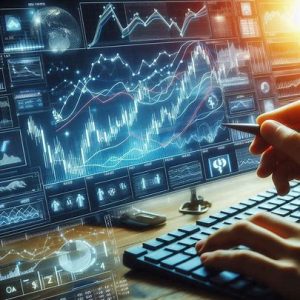
Financial markets are evolving rapidly, and AI-powered trading is leading the charge. Algorithms now execute trades faster and more efficiently than humans, analyzing vast amounts of data in real time to make split-second decisions. This transformation is making investing smarter and more dynamic than ever before.
Automated trading systems are no longer exclusive to hedge funds and large institutions. AI-driven platforms now provide opportunities to grow wealth for everyday investors. With improved accessibility, individuals can harness machine learning to optimize their trades, minimize risks, and maximize returns.
The Rise of AI in Financial Markets
AI trading uses complex algorithms to analyze market trends, historical data, and real-time events. Unlike traditional trading strategies, these systems adapt continuously, refining their approach based on new data. This adaptability gives AI traders a competitive edge in volatile markets.
Another key advantage is that AI trading eliminates human error. Traditional trading strategies rely on human analysis and decision-making, which can be affected by emotions, biases, or fatigue. AI systems, however, operate with pure logic and statistical precision, making more consistent and calculated investment decisions.
How Automated Trading Works
AI-powered trading platforms follow predefined rules and strategies, often based on machine learning models. They process multiple factors, including price movements, trading volume, and economic indicators, to predict optimal entry and exit points. High-frequency trading (HFT) is a prime example, where thousands of trades occur in milliseconds to capitalize on minuscule price changes.
Benefits of AI in Trading
AI trading systems offer several advantages:
- Speed: AI executes trades faster than any human trader.
- Precision: Algorithms analyze vast amounts of data with high accuracy.
- Risk Management: AI models identify potential risks and adjust real-time strategies.
- Emotion-Free Decisions: AI eliminates impulsive trading driven by fear or greed.
- Scalability: AI can manage multiple portfolios simultaneously without decreasing efficiency.
Economic Implications of AI Trading
The widespread adoption of AI in financial markets is reshaping economies worldwide. With increased efficiency, markets become more liquid, and price discovery improves. However, there are concerns about market stability, as algorithmic trading can lead to flash crashes when multiple systems react simultaneously to sudden price movements.
Additionally, AI trading is altering employment in the finance sector. While AI enhances productivity, it also reduces the need for traditional traders and analysts. Many financial firms are shifting towards tech-driven models, emphasizing algorithm development over manual trading expertise.
AI and Retail Investors
AI-powered platforms are lowering barriers for individual investors. Robo-advisors, for instance, use AI to manage portfolios based on user preferences and risk tolerance. This automation allows people to invest without needing deep financial expertise.
Moreover, AI-driven investment platforms offer real-time data analysis, helping retail investors make informed decisions. These platforms provide market insights, trend predictions, and risk assessments, making investing more accessible and less intimidating for newcomers.
Challenges and Ethical Considerations
Despite its benefits, AI trading raises ethical and regulatory concerns. Market manipulation, data privacy, and algorithmic biases are significant issues. Regulators are working to establish guidelines to ensure fair and transparent trading practices.
One major concern is the potential for AI-driven market manipulation. Because AI reacts quickly to market conditions, it can unintentionally contribute to stock price fluctuations. These fluctuations could destabilize markets and create significant risks for investors if left unchecked.
The Future of AI in Investing
AI trading is poised to become even more sophisticated. Advances in deep learning and neural networks will further enhance prediction capabilities. As technology evolves, AI will likely play an even bigger role in shaping global financial markets.
Future AI systems may integrate quantum computing to improve data processing speeds. This advancement could revolutionize trading by offering unprecedented levels of predictive accuracy and risk assessment.
READ ALSO: How Forex Trading Connects with Precious Metals
Conclusion
AI-powered trading is revolutionizing how investments are managed. With enhanced efficiency, accessibility, and precision, individual investors and institutions benefit from automation. However, navigating the risks responsibly is crucial to ensure a stable and fair financial environment.
As AI advances, investors must stay informed and adapt to new technologies. Understanding the benefits and limitations of AI trading will help market participants make smarter, more strategic decisions in this rapidly evolving landscape.

